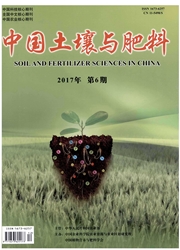

 中文摘要:
中文摘要:
在YMA平板上对18株分离自四川的慢生型花生根瘤菌进行Fe、Co、Zn、B、Mo、pH的耐性实验。结果表明,在柠檬酸铁、钼酸铵浓度为0.50%时供试菌株均能生长,当柠檬酸铁浓度增至1%时有22%的供试菌株能正常生长,当钼酸铵浓度增至0.6%时有11%的菌株能正常生长;在硼酸浓度为0.05%时所有菌株生长受抑制或不生长;在硫酸锌或硫酸钴浓度为0.025%时分别有50%或28%的菌株能正常生长,当浓度增至0.075%时,供试菌株不生长或61%的菌株不生长。表明供试菌株对Fe、Mo的耐性较强,而对Co、Zn、B的耐性较弱;不同根瘤菌株对同一微量元素的耐性差异较大,同一根瘤菌对不同微量元素的耐性差异也较大。多数菌株在pH 6.0-8.0范围内生长正常,耐碱能力比耐酸能力强。因此,在研制“根瘤菌+微量元素”复配的根瘤菌剂时,微量元素不能随意复配,同时还需注意菌剂的pH。
 英文摘要:
英文摘要:
18 strains of Bradyrhizobia sp. ( Arachis ) isolated from different places in Siehuan Province were compared for their growth or survival abilities under the stresses of Fe, Mo, Co, Zn and pH on YMA plates. The results showed that all strains could grow in 0.050% ferric citrate or ammonium molybdate. 22% strains could grow well in 1% ferric citrate, and 11% strains could grow well in 0.6% ammonium molybdate. All of tested strains grew bad, even could not grow when the concentration of boric acid was 0.05%. 50% or 28% Strains could grow well in 0.025% zinc sulfate or cobalt sulfate. Whereas in 0.075% zinc sulfate or cobalt sulfate all or 61% stains could not grow. The data indicate that the tested strains had higher tolerance to Fe and Mo, and lower tolerance to Co, Zn and B. There is substantial difference among different strains to a given mieroelement and among different mieroelements to a given strain. Most of the tested strains grew well when pH 6.0 - 8.0 and had higher tolerance to alkali conditions than to acid conditions. Therefore, mieroelements can't be arbitrarily added, and pH of the inoculant need a special attention in manufacture of the combined inoculant with mieroelements.
 同期刊论文项目
同期刊论文项目
 同项目期刊论文
同项目期刊论文
 Horizontal gene transfer and recombination shape mesorhizobial populations in the gene center of the
Horizontal gene transfer and recombination shape mesorhizobial populations in the gene center of the 期刊信息
期刊信息
